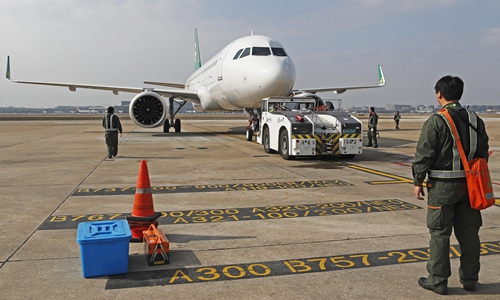HOME >> SOURCE
Global aviation crash landing
By Tu Lei Source:Global Times Published: 2020/3/25 17:38:40
Losses could hit $252 billion, but China’s domestic industry sees recovery

A Spring Airlines plane at Shanghai Hongqiao International Airport in December 2019 Photo: cnsphoto
Global aviation remains in a dark tunnel with no end in sight as the coronavirus pandemic spreads to more countries around the world, and insiders warn airlines could run out of money before there's a recovery.
Despite the grim global outlook, China's domestic market is now in recovery and is offering confidence to the global aviation industry.
The International Air Transport Association (IATA) on Tuesday updated its analysis of the COVID-19 impact on revenue in the global air transport industry, and now estimates passenger revenues could plummet $252 billion, or 44 percent below 2019's figure.
The prediction was made in a scenario in which severe travel restrictions persist for up to three months, followed by a gradual economic recovery later this year.
IATA earlier predicted up to $113 billion revenue losses, but that was before countries around the world introduced sweeping travel restrictions that largely eliminated international air travel. "The airline industry faces its gravest crisis. Within a matter of a few weeks, our previous worst-case scenario is looking better than our latest estimates. But without immediate government relief measures, there will not be an industry left standing," IATA CEO Alexandre de Juniac warned.
Within a few weeks, the industry has reached the edge of a cliff and the bad news has not stopped flooding in.
Flight cancellations hit almost 20,000 globally by Monday, with more than 30 airlines around the world grounding all international flights. GE Aviation has said it will lay off 10 percent of its US workforce.
Etihad Airways on Monday said it has joined Emirates in suspending all flights in response to government coronavirus restrictions affecting inbound, outbound and transit passenger flows in the United Arab Emirates.
With the rapid spread of the virus globally, at least 31 countries and regions have adopted entry restrictions, a devastating blow to the global aviation industry. De Juniac said this crisis is far worse than that experienced after the 9/11 attacks.
Airlines will run out of cash before the recovery lands. Most airlines had sufficient cash for two months at the start of this year, according to IATA.
Aviation and travel market intelligence provider CAPA has warned that most of the world's airlines may face bankruptcy by May if there is no support from governments by that time.
But the good news is that more countries are taking measures to save the hemorrhaging industry, and China's domestic air travel has shown signs of reaching a turning point as passenger yield stabilizes.
In the first two weeks of February, the passenger yield in China's domestic market was still in negative growth of about 25 percent, but quickly rose to 15 percent negative growth in the following two weeks, then jumped to positive growth in the first two weeks of March, IATA data showed.
China Eastern Airlines said earlier that it plans to resume 14,329 flights from February 1 to March 28. In domestic flights part, it mainly resumes flights from Shanghai and Kunming in Southwest China's Yunnan Province to cities such as to Chongqing, Chengdu, Dalian and Guangzhou. Now, the sum of daily flights for the carrier is more than 1,000.
Traveler intelligence provider Adara has identified a new upward trend in data relating to Chinese travel in an analysis published on Saturday, according to ttgasia.com.
The number of unique travelers searching for flights to China declined over three weeks in February to just one-third of the number seen in early January. In the last two weeks, Adara has seen an increase in the number of searches. Unique searches were up 29 percent for the week starting March 8 compared to the week starting March 1, the report said.
China has introduced a number of supportive measures including reductions in landing, parking and air navigation charges, as well as subsidies for airlines that continue to operate flights to the country.
On Tuesday, the government said it will support carriers to increase international cargo flight capacity and stabilize supply chains, and will encourage air cargo firms and logistics companies to jointly restructure.
RELATED ARTICLES:
Posted in: INDUSTRIES